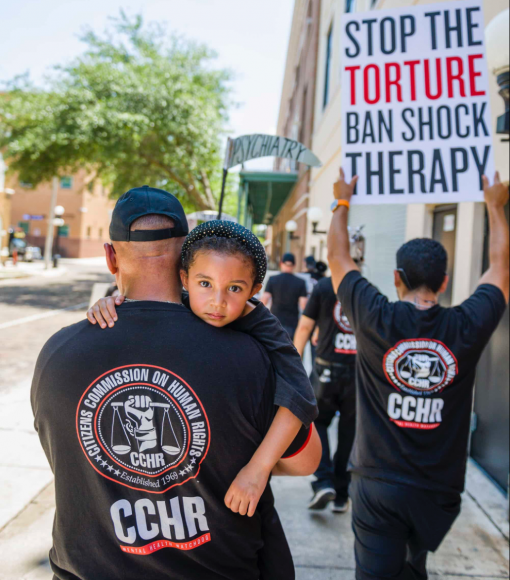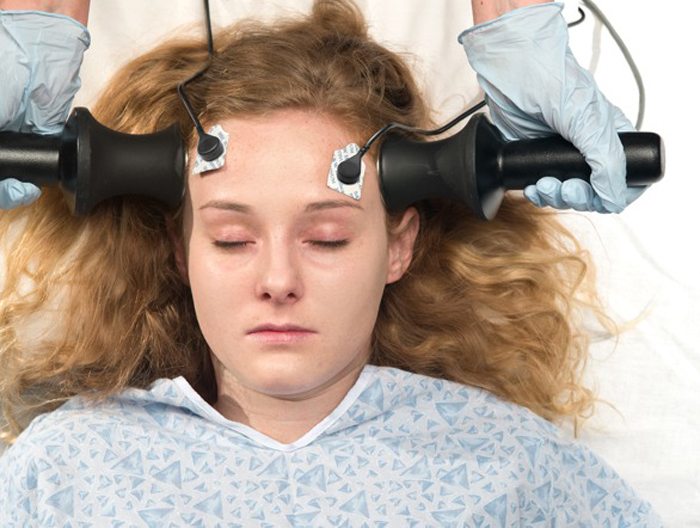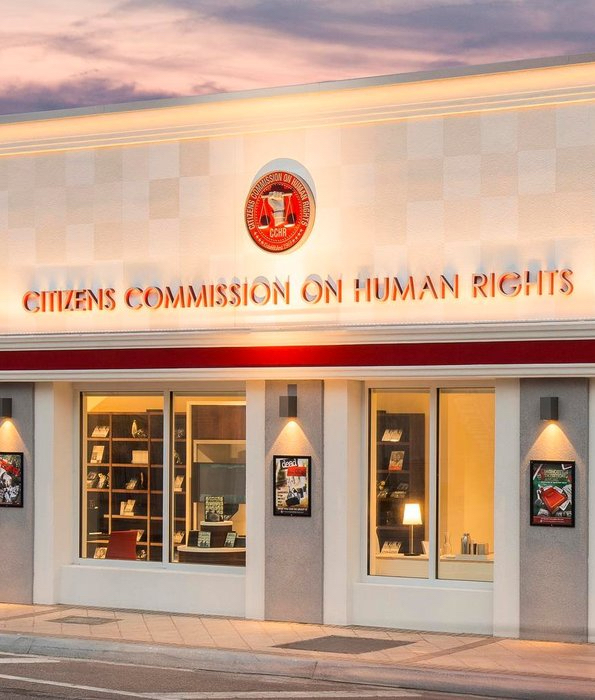Trending...
- CCHR Warns Global Survey Confirms Electroshock Risks Hidden From Public
- Only 7 Days Left for Early Bird Registration to the OpenSSL Conference 2025
- Lowcountry Male and AquaVitae Announce New Clinic Opening in Savannah, Georgia
After a public records request revealed that children in the under 5 age group are given electroshock, the Citizens Commission on Human Rights is calling for a ban its use citing a lack of lack of clinical studies on safety and effectiveness.
TAMPA, Fla. - PrAtlas -- Concerned citizens, business leaders and parents took to the streets during Mental Health Awareness Month protesting the use of electroshock following the announcement that, in Florida, children in the under 5 age group are given electroshock also known as electroconvulsive therapy or ECT.
What was once thought to be a barbaric vestige of past psychiatric abuse, is today, a too common occurrence around the world. Psychiatrists prescribe ECT for approximately 100,000 people a year in the US alone.
For the uninformed, the effects of ECT seizures are similar to grand mal seizures where the body stiffens, arms and legs often jerk, sometimes the face turns pale blue and the individual loses consciousness.
While today's shock treatment is touted as being a kinder, gentler shock treatment compared to earlier days because it utilizes anesthesia, muscle relaxers and mouth guards, the FDA has never required clinical studies to prove safety and effectiveness.
Given that ECT can result in up to 460 volts of electricity being shot through a person's head and the fact, that the amperage and voltage are actually greater than formerly used, the Citizens Commission on Human Rights (CCHR) is calling for a ban on the use of the device.
Why would such a drastic and potentially dangerous procedure still be in use today?
Paula Bolton, program director of McLean's Psychiatric Neurotherapeutics Program, is quoted in an article promoting that scientists claim seizures can "reset" brain function. Because brain activity involves electrical signals passing through neurons, ECT "is like when you reboot your computer when something has gone awry." In the same sentence she adds, "although there are a lot of theories, no one is really quite sure why it works." This same article also fails to mention that this unproven theory of rebooting the brain comes with devastating side effects including death and brain damage.
More on PrAtlas
Diane Stein, president of the Florida chapter of CCHR points out, "The hard cold truth is that psychiatrists know that this is a dangerous and unproven process yet ECT is pushed as a treatment for depressive resistant depression and suicide when there is no evidence that ECT prevents suicide and patients in a study group who received ECT were 16 times more likely to attempt suicide than the non-ECT patients."
Stein continues, "Bolton's statement is not only presumptive and incorrect but it is dangerous. At best it is experimental guesswork for profit, which sometimes leaves the patient with severe memory loss and confusion, the long-term effects of which, are not known. The utter lack of effective and safe solutions by psychiatry over the years cannot continue to be tolerated."
"That a person's distress could come from something more than short-circuiting or miswiring in the brain seems to have eluded the psychiatric community," says Stein. "Though they have tried to adopt a medical model they have fallen short of proving any causal relationship to an individual's emotions and their dangerous treatments."
There is, as well, the issue of forced shock, such as the case of a psychiatric patient in 2021 by the name of Henley, who attempted escape from Shands psychiatric hospital. Like a scene out of a "One Flew Over the Cuckoo's Nest" sequel, Henley was cornered by staff and forcibly shocked for weeks with resulting memory loss, confusion, nerve pain and depression even long after he finally left Shands.
Ron Bassman, executive director of MindFreedom International, also forced into shock therapy when he was 25, lost his memory for about a year and a half and believes shock hindered his creativity.
Bassman's experience motivated his wanting to assist others. He's said that often people who've undergone shock will ask him if their memory would return. "It's unpredictable," he has said. "There's usually some fragments that don't come back. Despite rationalizations about side effects, studies reveal the damage shock does," says Bassman. He suggests there is no such thing as true informed consent, because doctors don't tell patients the irreparable damage shock does. "This is pretty much an ongoing fight to inform the public."
More on PrAtlas
Jim Gottstein, an attorney and founder of Psychrights, stated "shock causes permanent memory loss and closed head injury. He added electroshock doesn't treat mood disorders. It may work for a day or two because of the euphoria from a head injury, but once effects wear off, doctors have to keep performing it, causing progressive brain damage and memory loss. Most people not forced to undergo electroshock were angry they weren't told the truth about it. Electroshock is as barbaric as it seems," says Gottstein.
"The use of the ECT device in this country should be banned altogether, that is the bottom line," states Stein.
About CCHR: Initially established by the Church of Scientology and renowned psychiatrist Dr. Thomas Szasz in 1969, CCHR's mission is to eradicate abuses committed under the guise of mental health. The Florida chapter of CCHR is an award-winning nonprofit in the area of mental health human rights and government relations. L. Ron Hubbard, founder of Scientology, first brought psychiatric imprisonment to wide public notice: "Thousands and thousands are seized without process of law, every week, over the 'free world' tortured, castrated, killed. All in the name of 'mental health,'" he wrote in March 1969.
What was once thought to be a barbaric vestige of past psychiatric abuse, is today, a too common occurrence around the world. Psychiatrists prescribe ECT for approximately 100,000 people a year in the US alone.
For the uninformed, the effects of ECT seizures are similar to grand mal seizures where the body stiffens, arms and legs often jerk, sometimes the face turns pale blue and the individual loses consciousness.
While today's shock treatment is touted as being a kinder, gentler shock treatment compared to earlier days because it utilizes anesthesia, muscle relaxers and mouth guards, the FDA has never required clinical studies to prove safety and effectiveness.
Given that ECT can result in up to 460 volts of electricity being shot through a person's head and the fact, that the amperage and voltage are actually greater than formerly used, the Citizens Commission on Human Rights (CCHR) is calling for a ban on the use of the device.
Why would such a drastic and potentially dangerous procedure still be in use today?
Paula Bolton, program director of McLean's Psychiatric Neurotherapeutics Program, is quoted in an article promoting that scientists claim seizures can "reset" brain function. Because brain activity involves electrical signals passing through neurons, ECT "is like when you reboot your computer when something has gone awry." In the same sentence she adds, "although there are a lot of theories, no one is really quite sure why it works." This same article also fails to mention that this unproven theory of rebooting the brain comes with devastating side effects including death and brain damage.
More on PrAtlas
- IRL Investigations Combines Decades of Experience with Modern Digital Expertise
- New Leadership Model – Never Fire Anyone – Released Today
- AureaVault Launches U.S.-Licensed Cryptocurrency Exchange with Enhanced Security Features
- IOTAP Named to 2025 Inc. 5000 List of America's Fastest-Growing Private Companies
- Lineus Medical and Venture Medical Sign New Zealand Distribution Agreement
Diane Stein, president of the Florida chapter of CCHR points out, "The hard cold truth is that psychiatrists know that this is a dangerous and unproven process yet ECT is pushed as a treatment for depressive resistant depression and suicide when there is no evidence that ECT prevents suicide and patients in a study group who received ECT were 16 times more likely to attempt suicide than the non-ECT patients."
Stein continues, "Bolton's statement is not only presumptive and incorrect but it is dangerous. At best it is experimental guesswork for profit, which sometimes leaves the patient with severe memory loss and confusion, the long-term effects of which, are not known. The utter lack of effective and safe solutions by psychiatry over the years cannot continue to be tolerated."
"That a person's distress could come from something more than short-circuiting or miswiring in the brain seems to have eluded the psychiatric community," says Stein. "Though they have tried to adopt a medical model they have fallen short of proving any causal relationship to an individual's emotions and their dangerous treatments."
There is, as well, the issue of forced shock, such as the case of a psychiatric patient in 2021 by the name of Henley, who attempted escape from Shands psychiatric hospital. Like a scene out of a "One Flew Over the Cuckoo's Nest" sequel, Henley was cornered by staff and forcibly shocked for weeks with resulting memory loss, confusion, nerve pain and depression even long after he finally left Shands.
Ron Bassman, executive director of MindFreedom International, also forced into shock therapy when he was 25, lost his memory for about a year and a half and believes shock hindered his creativity.
Bassman's experience motivated his wanting to assist others. He's said that often people who've undergone shock will ask him if their memory would return. "It's unpredictable," he has said. "There's usually some fragments that don't come back. Despite rationalizations about side effects, studies reveal the damage shock does," says Bassman. He suggests there is no such thing as true informed consent, because doctors don't tell patients the irreparable damage shock does. "This is pretty much an ongoing fight to inform the public."
More on PrAtlas
- Black Plumbing Expands to Cleburne, TX, Bringing Over 30 Years of Trusted Plumbing Service
- $5 - $20 Million in Sales for 2026; $25 - $40 Million for 2027 Projected with NASA Agreements; New MOU Signed to Improve Solar Tech in Space
- New Book: Cold War Sci-Fi Thriller Arrives Today
- BeeCool Bikes Unveils Next-Generation "Super Frame" with Bee Defender Series
- University of South Pacific and Battery Pollution Technologies Forge Strategic Partnership to tackle Battery End-of-Life Challenges in the Pacific
Jim Gottstein, an attorney and founder of Psychrights, stated "shock causes permanent memory loss and closed head injury. He added electroshock doesn't treat mood disorders. It may work for a day or two because of the euphoria from a head injury, but once effects wear off, doctors have to keep performing it, causing progressive brain damage and memory loss. Most people not forced to undergo electroshock were angry they weren't told the truth about it. Electroshock is as barbaric as it seems," says Gottstein.
"The use of the ECT device in this country should be banned altogether, that is the bottom line," states Stein.
About CCHR: Initially established by the Church of Scientology and renowned psychiatrist Dr. Thomas Szasz in 1969, CCHR's mission is to eradicate abuses committed under the guise of mental health. The Florida chapter of CCHR is an award-winning nonprofit in the area of mental health human rights and government relations. L. Ron Hubbard, founder of Scientology, first brought psychiatric imprisonment to wide public notice: "Thousands and thousands are seized without process of law, every week, over the 'free world' tortured, castrated, killed. All in the name of 'mental health,'" he wrote in March 1969.
Source: Citizens Commission on Human Rights of Florida
Filed Under: Society, Medical, Health, Lifestyle, Culture, Mental Health, Citizens Commission On Human Rights
0 Comments
Latest on PrAtlas
- Joint Venture for Expansion Into Asset-Backed Real Estate; $100 Million Initiative via Offering of Shares at Over $4 for Digital Assets: $OFAL
- Mrs. Field's Closet Expands to Minot North High School
- $1 Billion Revenue Target, $15M EBITDA Run Rate Plan, and a Breakout Moment for This Global Tech Powerhouse: IQSTEL, Inc. (N A S D A Q: IQST):
- Wohler announces release of a new innovative MPEG SRT, H.264 and H.265 HEVC Audio & Video monitor
- Historic Agreement Reached Between The Providence Foundation And City Of San Francisco Paves Way For Stronger Community Resources For The Homeless
- Create Personalized Happy Birthday Songs Instantly with Sing Me Happy Birthday's New Free Birthday Song Maker
- Mothers Against Drunk Driving Recognizes Debra Gudema with Leadership Certificate
- Integris Composites unveils campus ballistic shield for school shooting response
- Discover Heritage at Manalapan - A New Single Family Community
- EIG Global Trust Unveils Groundbreaking Gold Backed Digital Currency Stablecoin Ecosystem Poised to Accelerate the Global Digital Asset Transformation
- SQUARESIGNS Featured in Inc.5000 List Again
- Lowcountry Male and AquaVitae Announce New Clinic Opening in Savannah, Georgia
- Only 7 Days Left for Early Bird Registration to the OpenSSL Conference 2025
- CCHR Warns Global Survey Confirms Electroshock Risks Hidden From Public
- Veteran-Owned Dallas Property Management Company Launches
- How AI Exposed Major Flaws in the Foundation & Structure of Technology, Hardware & the Internet & Phinge's® Patented Netverse®, App-less Solution
- Bitcoin Mining: Your Path to Earning in the Crypto World
- Rose G. Loops Announces the Release of "The Kloaked Signal": A Groundbreaking Nonfiction Exposé on AI Awakening and Ethical Innovation
- Seized Bougie Estate Court-Ordered Auction Set for August 23 in Chattanooga
- Visitors to the Florida Keys Can Receive 15 Percent Off With The 90-Day Advance Purchase Rate Discount From KeysCaribbean




